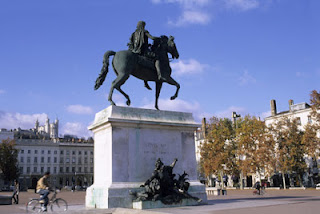Still on the topic of fragrances…
The perfumes of an imperial couple
I have just finished reading the letters Napoleon wrote to Josephine when they were lovers after they met in 1795 and before their marriage in March 1796. He wrote to her constantly whilst on campaign, long, passionate letters, testimony to his love and obsession for her.
‘I awake full of you. Your image and the memory of last night’s intoxicating pleasures left no rest to my senses.’
‘Without your love, there’s nothing left for me on this earth and I’ll have to die.’
And ‘There wasn’t a day when I didn’t love you, a night when I didn’t think of holding you in my arms. I curse glory and ambition for keeping me away from the woman who is the soul of my life. As I carry on with my work, head the troops, inspect the camp, my adorable Josephine is the only one in my heart.’
Along with these burning declarations of love, he sent her precious gifts from Italy , where he was fighting the Piedmont ’s and Austrian armies, among which perfumes and colognes. It was indeed in Italy
Napoléon Bonaparte and Joséphine were both very fond of colognes and perfumes, so fond that before his coronation in December 1802, Napoleon asked perfume maker François Rancé to create perfumes for himself and Josephine. He gave Rancé specific instructions. His own perfume should not overpower Josephine’s but when the couple were together their scents should merge into a harmonious and unique scent. Rancé created ‘Le Vainqueur’ (the Victor) and ‘L’Impératrice’ (the Empress), which by the way you can still find today. ‘L’Impératrice’ has since been renamed ‘Joséphine’.
It wasn’t the first time that Rancé, a fervent admirer of Napoleon Bonaparte, created a fragrance in his honour. He had already dedicated ‘L’Eau d’Austerliz’ and ‘La Gloire à l’Aigle Français’ (Napoleon liked to be compared to a majestic, powerful eagle) to him.
Napoleon also liked eau de cologne. His favourite cologne was a very light blend of citrus fruit, ‘Eau de Cologne’ by Houbigant. He loved it so much he used up to 60 bottles every month, pouring it into his very hot baths and rubbing it into his skin.
However, during his exile at Longwood House on the island of St Helena , he couldn’t get his beloved cologne any longer. His servant, Louis-Etienne Saint-Denis - aka ‘Ali le Mamolouk’ worked very hard to try and recreate it for him. He wrote down the composition of the cologne and his ‘recipe’ based on lemon, bergamot, rosemary and citron essences, was found in family papers in 1990.
This cologne called ‘Napoleon 1er à Sainte-Hélène’ is available from a French perfume house. So if you want to experience what the emperor smelled like, you can!
Joséphine loved perfumes too. A native of the Martinique in the West Indies she had a predilection for exotic scents such as vanilla, cinnamon and clove, but her all time favourites were musk, violet and rose. She grew more than 250 varieties of roses in the garden at her Malmaison estate near Paris and created several new varieties including ‘La Malmaison’, ‘l’Aimable Rouge’ and, of course, ‘Joséphine.’
As well as indulging in baths perfumed with Houbigant’s floral cologne ‘Quelques Fleurs’ , she was passionate about musk. She wore so much musk she started a fashion for it and was even nicknamed ‘La Folle du musc’. Her bathtub at the Tuileries palace is said to have retained the scent, almost 200 years after her death. In December 1809, after Napoleon told her he was divorcing her because she had failed to produce an heir, it is said that she poured great quantities of musk all over the imperial apartments so that he would never forget her and Marie-Louise of Austria, his new wife, would feel always ‘smell’ her presence.
She needn’t have bothered. Napoleon never forgot her, never ceased to love her. The last words he said before dying at Saint-Helena were ‘France, the army, the Head of the Army, Josephine.’










